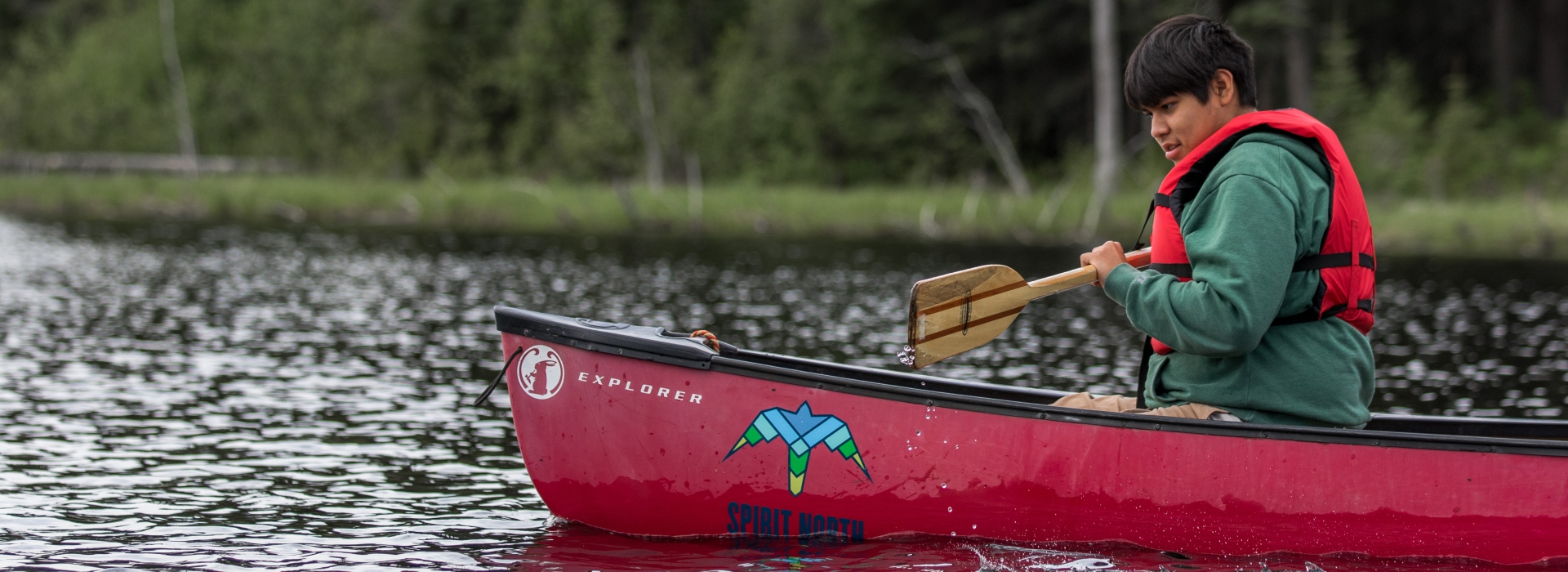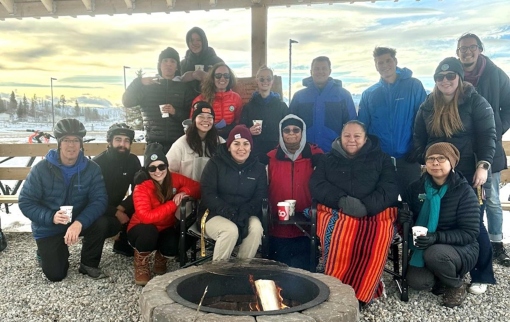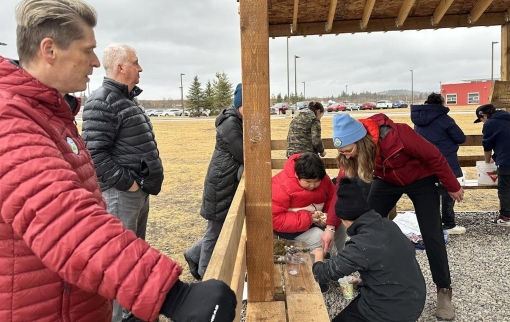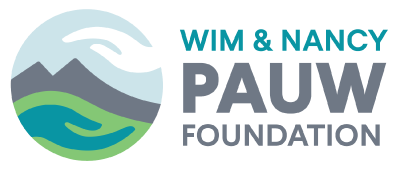OUTDOOR EDUCATION & LAND-BASED LEARNING TRANSFORMING THE EDUCATIONAL LANDSCAPE AT MÎNÎ THNÎ
From traditional academic pursuits like math and science, to mastering the Stoney language and learning from the lived experience of Elders, a deep-rooted connection to the land is permeating every facet of the learning experience for about 900 students at Mînî Thnî Community School and Nakoda Elementary School.
In fact, integrating nature-based learning directly into the curriculum is evolving so quickly in Mînî Thnî, the Stoney Education Authority (SEA) is building new facilities to ensure as many students as possible can take part in the transformative part of their learning journey.
Since 2021, the Wim and Nancy Pauw Foundation have donated $310,000 to SEA to support both programming initiatives and the development of infrastructure at local schools. While funding outdoor education and land-based learning opportunities remains the priority, this donation is helping SEA significantly expand these programs and make them permanent components of its educational programming. By constructing these purpose-built facilities, generations of students and teachers will be able to access the space and resources needed to truly integrate this vital learning opportunity directly into the community.
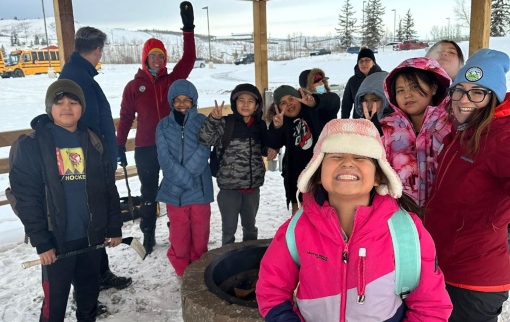
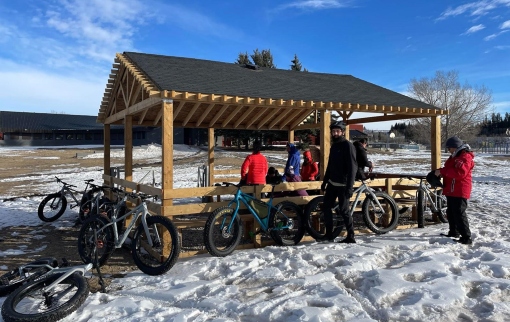
“Outdoor education is not just about imparting academic knowledge; it’s about instilling life skills, nurturing curiosity, and fostering a profound and deep-seated appreciation for our cultural heritage intertwined with nature,” said Bill Shade, Superintendent of Stoney Education Authority. “By expanding our program and integrating it into all grades, all of our students will benefit from these formative opportunities.”
Introduced to the grade four students in 2021 at Nakoda Elementary School, the NES Wild program quickly proved to students, teachers, and the community the incredible impact outdoor learning can have on students. The resounding success relating to improved attendance, enhanced learning outcomes, and strengthened community engagement made it clear to everyone at SEA that expanding these kinds of initiatives across all grades was an obvious next step.
“Watching the growth of land-based learning programs at Mînî Thnî has been incredible, and the Pauw Foundation is pleased to be able to help support this momentum,” said Cathy Geisler, Executive Director at the Wim and Nancy Pauw Foundation. “These new buildings will be the hub for outdoor, nature-based learning, and a home for many opportunities that will celebrate and preserve the community’s cultural heritage and traditions while further strengthening their connection to nature and each other.”
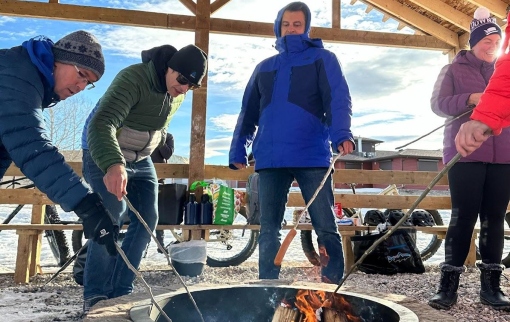
The new outdoor learning center will be the hub for these programs, with a central gathering space for collaborating and learning from community experts and educators; a kitchen and freezers for traditional cooking after fishing, hunting, and gathering; a space to host visitors; an opportunity to house educational resources; and will offer refuge during adverse weather conditions. An additional space, the PAUW Pavillion, will provide a sheltered outdoor gathering area conducive to learning, project development, and the promotion of traditional learning.
Aligned with the Alberta curriculum, these initiatives are designed to offer students hands-on experiences that promote educational outcomes and problem-solving skills. Drawing from the local cultural heritage and community-led learning, teachers and community experts are building a lesson library that will be shared across SEA. Committed to protecting the legacy of traditional wisdom, each module will be reviewed by community Elders and Knowledge Keepers to ensure authenticity, relevance, and enduring value for generations of learners.
Beyond academic achievement and infrastructure, the long-term benefits of investing in outdoor learning for students at Mînî Thnî are immeasurable. By promoting physical well-being, environmental consciousness, and intergenerational connections with community Elders, these initiatives are poised to become cornerstones of the educational landscape across SEA’s division, now and for generations.
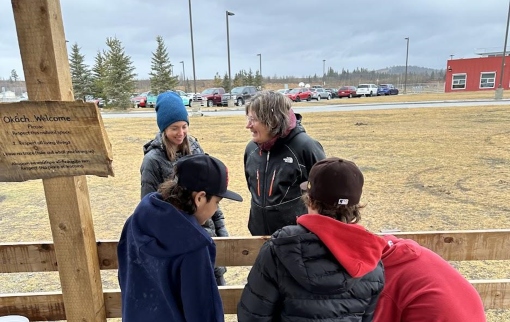
“Establishing these new facilities are essential for the expansion of our outdoor education and land-based learning program,” says Chris Goodman, Director of Outdoor Education. “The program will enable students to build confidence and connection to their learning, cultural heritage and community as they are immersed in culturally rich hands-on exploration and practical learning experiences allowing students to develop skills like environmental stewardship, problem-solving, and teamwork”.
While the new buildings will primarily serve students from Mînî Thnî Community School and Nakoda Elementary School, they will also provide facilities for collaborating with other school boards, community groups, and students from remote schools in Eden Valley and Big Horn. SEA also plans to hold professional development days in partnership with organizations like Take Me Outside and Spirit North.

